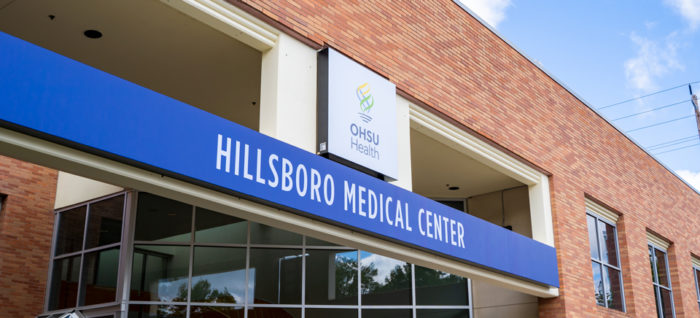Price change for COVID vaccines and tests
As of May 11, 2023, COVID vaccines and tests may no longer be free of cost to you. Check with your health plan to see what they cover. Hillsboro Medical Center will bill you for what your insurance doesn’t pay. Vaccines will still be free for Medicare, Medicaid and Children’s Health Insurance Program.
COVID-19 Vaccine Information and Locations
Who can get vaccinated?
All people in Oregon age 6 months and older are eligible to receive the COVID-19 vaccine.
Vaccine locations and appointments
Hillsboro Medical Center
Those 12+ can make an appointment by calling your Hillsboro Medical Center primary care clinic, if you have one. If you don’t have a primary care provider, you can start care and set up a vaccine appointment at the same time: Call 503-681-1600.
OHSU Health pharmacies
COVID-19 vaccines are by appointment only at OHSU Health pharmacies, including the OHSU Pharmacy in the 7th Avenue Medical Plaza at 333 SE 7th Avenue in Hillsboro. Appointments can be made by calling the pharmacy where you would like to be vaccinated.
Other locations
Use Vaccines.gov to find a location near you, then call or visit their website to make an appointment.
COVID Testing Options
COVID testing (though NOT for travel) is offered at Forest Grove Immediate Care. Appointments are required and you must call in advance to schedule.
Additional testing sites can be found on OHSU’s coronavirus resources page.
Those without insurance may still be eligible for no cost testing. More information about no cost testing can be found here.
Operations

We recommend that everyone wear a mask at the hospital.
Patient rights to have support people
People with disabilities can have a support person at their bedside around the clock, in accordance with state law, and will be restricted to three people in a 24-hour period.
COVID-19 Vaccine Frequently Asked Questions
Additional doses, booster shots
What’s the difference between an additional doses and a booster shot?
Additional dose: When someone with a weakened immune system gets an additional dose of vaccine, it is not a booster. It is part of the first series of shots needed for the person to be fully vaccinated. Many people with impaired immunity did not have a full response to their first doses.
Booster shot: An additional dose is a booster when someone had a full response to vaccination, but effectiveness wanes over time. The booster re-energizes their immune response.
General
What are the symptoms of COVID-19?
According to the CDC, these symptoms may appear
2-14 days after exposure to the virus. They can include:
- Cough
- Shortness of breathe or trouble breathing
- Fever
- Chills
- Repeated shaking with chills
- Muscle pain
- Headache
- Sore throat
- New loss of taste or smell
- Nausea or vomiting
- Diarrhea
Is there a vaccine to prevent COVID-19?
Yes. Vaccines are recommended for everyone 6 months and older, and those who are up to date on vaccination have a lower risk of severe illness, hospitalization, and death from COVID-19. COVID vaccines have been updated over time as the virus has changed. Please speak with your care provider to understand if there are updated vaccines recommended for you.
When should I get medical attention for COVID-19?
If you see
emergency signs, call 911 or your emergency department. They are:
- Trouble breathing
- Persistent pain or pressure in the chest
- New confusion or inability to awaken
- Bluish lips or face
- Other severe symptoms
What should I do if I’m sick with COVID-19?

- Stay home except to get medical care.
- Separate yourself from other people and pets in your home as much as possible.
- Monitor your symptoms.
- Consider an OHSU Health virtual visit. If you are unvaccinated or have medical comorbidities, you may be eligible for antiviral treatment.
How do I protect myself and others from COVID-19?
Get vaccinated: If you are 6 months and over, getting vaccinated is one of the best ways to protect yourself and your loved ones from COVID-19. All approved vaccines have been proven safe and effective. Vaccines are highly effective against severe disease and hospitalization.
Wear a mask or face covering: Masks continue to be recommended in crowded spaces and for those who are not vaccinated or who have been exposed to someone with COVID-19.
Wash your hands often: Wash your hands with soap and water for at least 20 seconds, especially after blowing your nose, coughing or sneezing. If you don’t have soap and water, use a hand sanitizer with at least 60% alcohol. Avoid touching your eyes, nose, and mouth.
Stay home when you are sick: If you have symptoms of respiratory infection, stay home until you are feeling better. If you test positive for COVID-19, stay home for at least 5 days and follow CDC’s isolation recommendations. When possible, avoid contact with people who have suspected or confirmed COVID-19.
Cover coughs and sneezes: Cover coughs and sneezes with a tissue or the inside of your elbow. Throw the tissues in the trash. Immediately wash your hands with soap and water for at least 20 seconds. If soap and water are not readily available, clean your hands with a hand sanitizer that contains at least 60% alcohol.
Move activities outside and consider distancing: The closer you are to a greater number of people, the more likely it is to be exposed to the virus that causes COVID-19. If cases or hospitalizations are increasing in our community, you may want to avoid crowded areas, keep distance between yourself and others, and move indoor activities outdoors when possible.
Where to learn more
We’ve compiled a list of helpful links to keep you informed about COVID-19.
COVID-19 information
Community Resources
- Call 211 from a mobile phone.
- Call 503-222-5555 from a landline.
- Email help@211.com for general information.
FAQ


